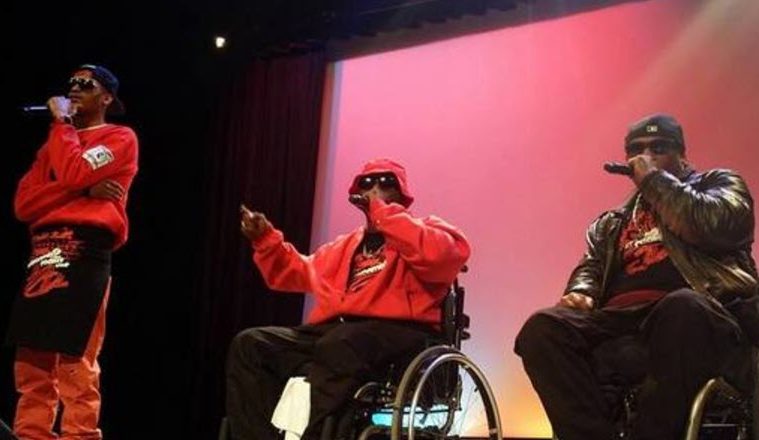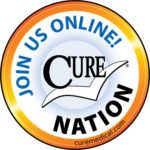 The multi-award winning rap group made up of two consummate New Yorkers, 4 Wheel City, has undertaken the quest of producing positive rap music as a method of teaching young people about the dangers of impulsive decisions that can have life-changing consequences.
The multi-award winning rap group made up of two consummate New Yorkers, 4 Wheel City, has undertaken the quest of producing positive rap music as a method of teaching young people about the dangers of impulsive decisions that can have life-changing consequences.
As performers who use wheelchairs, 4 Wheel City’s founders understand those risks and consequences all too well. Below, CURE NATION contributor Julienne Dallara speaks with the duo to help share their message of positive choices far and wide.
On the day I interviewed Namel “Tapwaterz” Norris and Ricardo “Rickfire” Velasquez, I was also called to visit a young woman in a wheelchair. She’d been paralyzed for over 2 years and never met another female wheelchair user.
How does this kind of isolation happen, I wondered? When I was paralyzed and in rehab back in 1996, many wheelchair users approached me, specifically to make friends and share their experience. Was I the exception? Had things changed so much?
VIDEO: Welcome To Reality (4 Wheel City Anti Gun Violence message)
A connection in hope: 4 wheel city unites
Apparently things have changed, and not for the better. Namel’s story in New York was an eerie repetition of my new friend’s story in California. Namel’s mom had a chance encounter with Rick and asked him to come talk to her son several years ago after Namel had been paralyzed.
Rick was paralyzed at age 19 in 1996 from gun violence, followed by Namel who was paralyzed at 17 in 1999, also from gun violence.
Rick remembers, “Namel wasn’t sure back then why I was calling, but he let me come over and talk. It wasn’t about music at that point, it was more about friendship and moral support.”
They had a lot in common with growing up in a similar neighborhood, with a similar upbringing and a love of the same music which would take on a life of its’ own later. At first though, their mutual frustration with their hospital rehab’s inadequate preparation after spinal cord injury helped them to create a strong bond.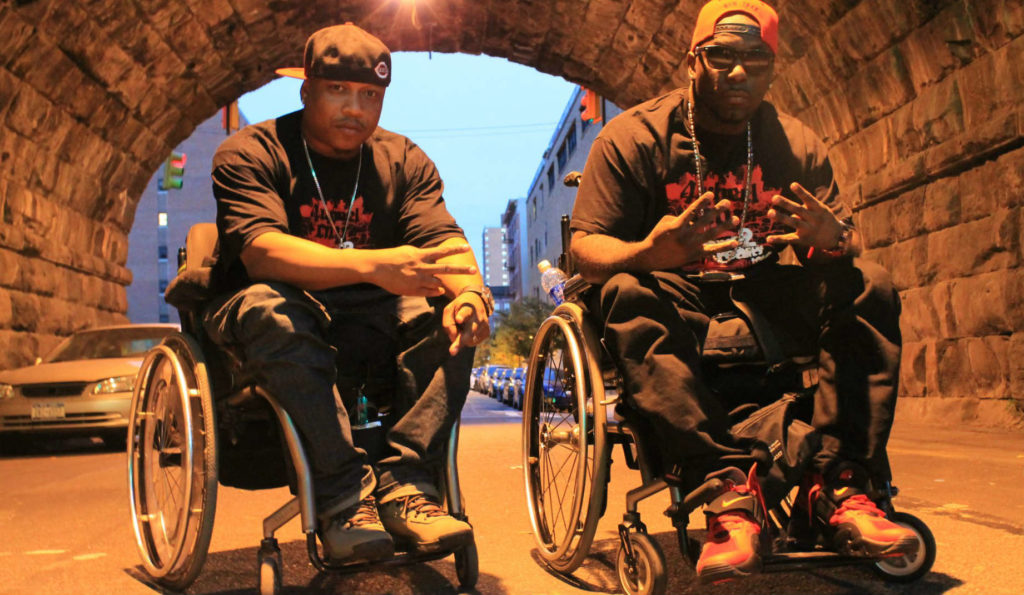 “I was at Jacobi hospital in the Bronx for a total of two months. Two months,” Rick says, his voice rising in anger.
“I was at Jacobi hospital in the Bronx for a total of two months. Two months,” Rick says, his voice rising in anger.
“Insurance kicks you out when you don’t even know how to transfer! Since my apartment wasn’t accessible, I was sent to a nursing home in Queens. When my sister saw how bad it was there, she made me move in with her. It wasn’t completely accessible, but it was better than that nursing home,” he continues.
Namel experienced a similar journey in rehab after an average day hanging out with his cousin. Unfortunately, his cousin was also hanging out with a handgun. When the gun accidentally fired, Namel instantly became a C-6 quadriplegic.
“I was the only young person plus the only one with a spinal cord injury during my whole six months in the hospital. I had collapsed lungs, plus a brachial plexus injury so I couldn’t do rehab. I also didn’t meet anyone else in a wheelchair,” Namel explains.
“The whole process of getting in the groove, back to my life, didn’t begin until after I met Rick,” he adds.
“I wanted to get back to music but the studio I was going to wasn’t accessible. Meeting Rick gave me an opportunity to do music, for the first time since I got shot!”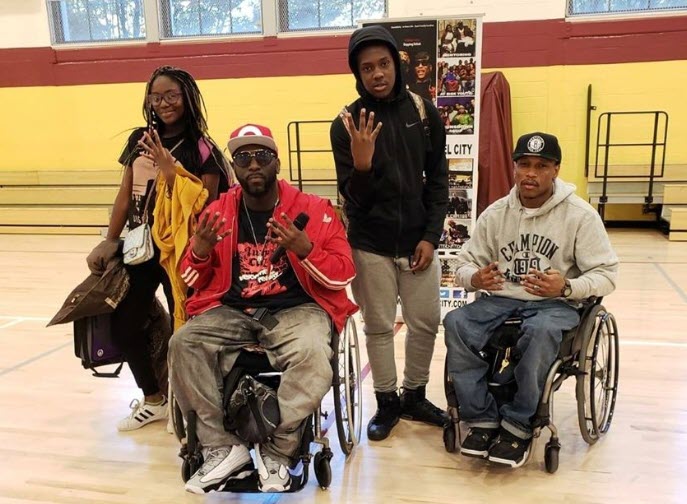
4 WHEEL CITY: making music together
They started making albums in 2006, with Namel as the rapper and Rick as the producer. Under the stage name of 4 Wheel City, they launched the ‘Welcome to Reality’ tour in 2008.
Namel shares, “We began seeing the landscape of hip hop at the time, started to see that there were other things going on. We had a lot of experience seeing changes that needed to be made. We wanted to give folks some insight as to what a person in a wheelchair can do to follow his dreams.”
“We got great reactions for breaking barriers and speaking up for people – we became a whole movement.”
Namel’s voice is animated as he recounts, “It happened as an idea when were already performing at schools and hospitals. We thought it was a good way to reach more youth by doing a tour in NYC. Then the next step was to take the same thing we were doing in NYC to other states and cities.”
How PERCEPTIONS OF RAP CHANGED
“The big difference in audience diversity came when Obama became president. For the first time, we got to see a lot of different types of people at our performances,” Namel says.
“There were younger people, students, who were curious because we were from New York City. Our message is always to never give up, follow your dreams, stay away from gun violence, really hit big. Hardships don’t mean that your life is over! Yes, you can! People responded to that in a big way.” 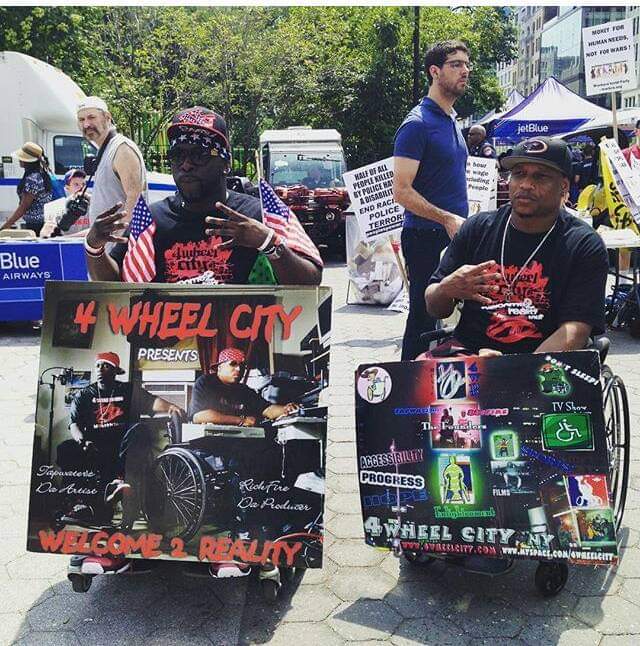
“This might go over people’s heads,” Namel surmises, “but we are the most authentic rap group. We talk about real things. We used to talk about all the negative stuff that other groups riff on, but now we’re taking responsibility for what we publish and promote.”
Rick cuts in, “because we want to make a beat that is so dope! It might be a song about how we can’t get our own music in stores, but we are using the talent we got.”
“The beat still has to be hot, and the talent there is hot.”
Namel picks up the thread, adding “Some of our fans might not be able to relate to the message, but still might think like, ‘I’m not in a chair but I get what he’s saying. Next time I won’t park right here where the curb cut is at.’ ”
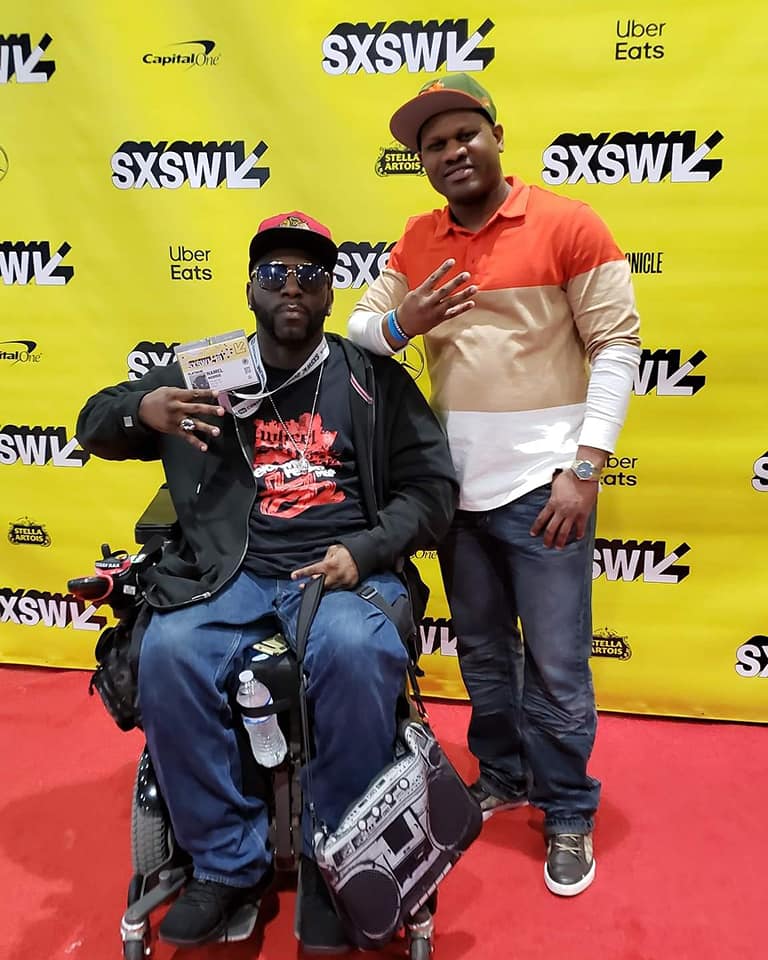
4 Wheel City enjoyed the amazing experience of attending SXSW music conference.
Expanding Goals Along with Perspectives
When it comes to goals for defining success, 4 Wheel City’s own aspirations have evolved over time.
“When we started, we had a different industry. Today, the way people listen to music has changed. We started as trail blazers! We didn’t start out talking to kids at school about gun violence,” Namel says.
Rick interjects again, “but that transition came pretty fast. We have responsibility to both the hip hop and disability markets. We have found that these two groups don’t really know much about each other. Both exist and can help each other, so we have a responsibility to connect them.”
For Rick and Namel, connections made through music have a powerful connotation.
Namel says,” A lot of change happens because we stay true to our purpose and don’t try to change it too much. We know what we need to say, and we say it until everyone hears it.”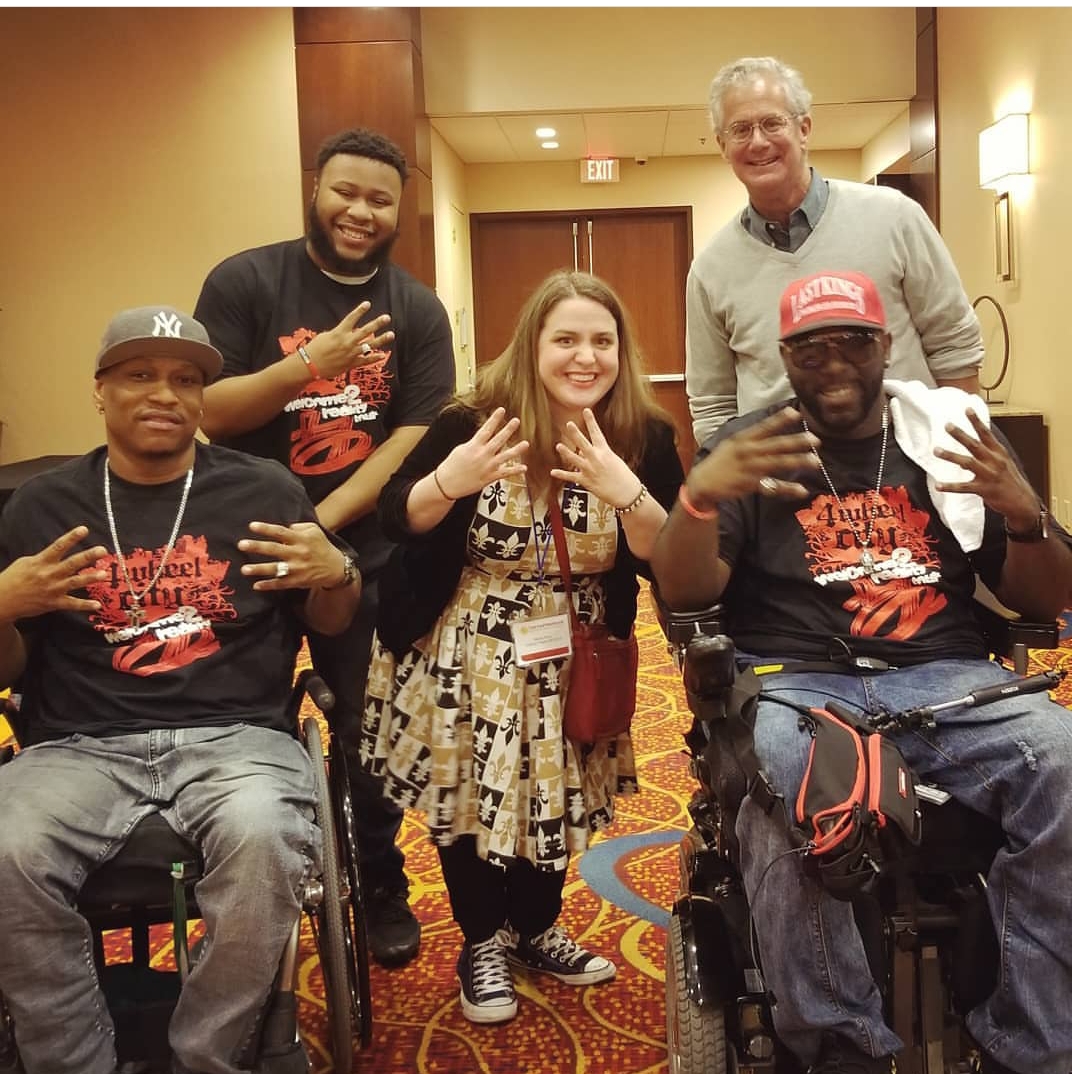 “We feel like we are way ahead of our time,” he adds. “Hopefully it’ll keep opening doors for us. We started going all over the world. We’ve performed at the White House, the United Nations, and the US Capitol building in Washington. We’ve even worked with Snoop Dogg, that was dope.”
“We feel like we are way ahead of our time,” he adds. “Hopefully it’ll keep opening doors for us. We started going all over the world. We’ve performed at the White House, the United Nations, and the US Capitol building in Washington. We’ve even worked with Snoop Dogg, that was dope.”
Their White House visit stands out as a career-changing event for them as both Namel and Rick were invited to the White House during President Obama’s last year in office, with the specific task of speaking about living in poverty as a person in a wheelchair.
Both men agree that it was an incredible honor, and it gave them insight into how much work it takes on multiple levels in government to get something done.
“Our song ‘Mainstream’ is based on our goal “Disable Poverty by 2025,” Rick explains. “This movement began as a song, and our next step is to get the changemakers on Capitol Hill behind it. People who can make change in legislation need to hear from people in wheelchairs, not just us two, but everybody. We can serve as a voice for our people, but that’s not enough. Everyone needs to get involved.”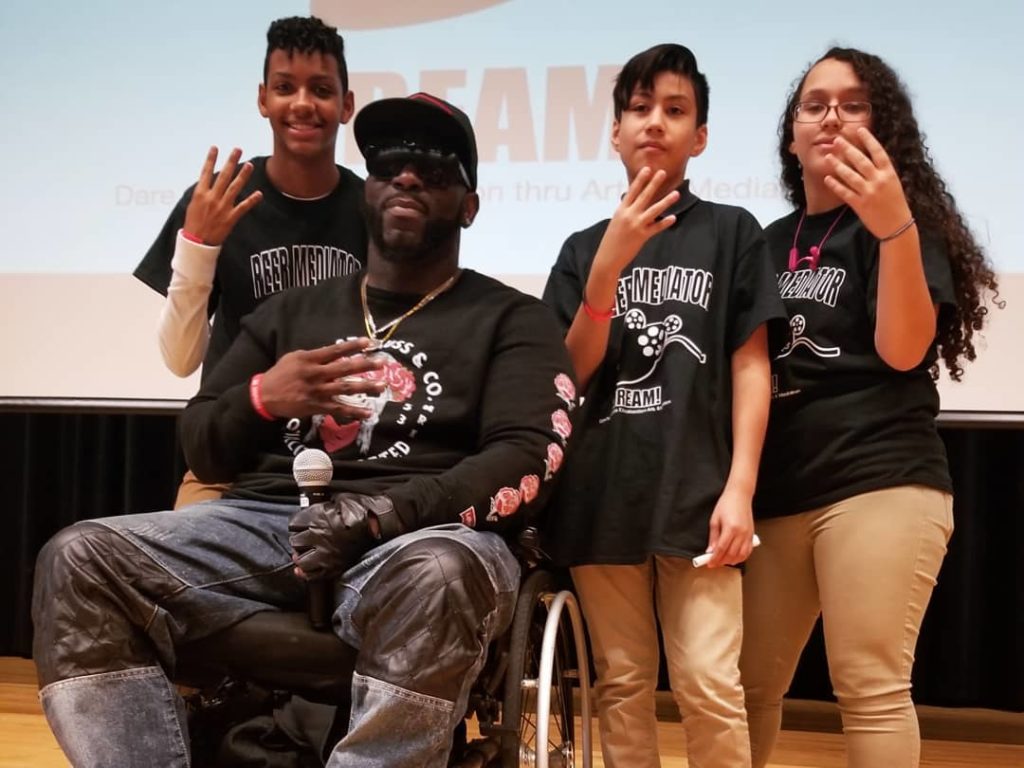
4 wheel city’s love of cure Catheters
As catheter users, Namel and Rick can choose which brand of catheter they prefer. That’s why we’re thrilled to learn they prefer a Cure catheter for their individual needs.
We were even more honored to learn how much they value the Cure Commitment, as Cure Medical is the only catheter manufacturer in the world that donates 10% of net income to medical research programs in pursuit of a cure for urinary retention, paralysis, spinal cord injury and central nervous system disorders.
“I’ve seen that written on the box (about Cure Medical’s donations), but I never knew if it was true or not. I’m glad to know that they really do it,” Namel says.

Did You Know? The Cure Ultra® Coude for men is pre-lubricated, and has a bent tip along with a blue control stripe to help with comfort and accuracy during insertion.
 To request free samples of the Cure Ultra® Ready-to-Use Catheter for men or any Cure Medical catheter, contact your local distributor of quality healthcare products, or click here.
To request free samples of the Cure Ultra® Ready-to-Use Catheter for men or any Cure Medical catheter, contact your local distributor of quality healthcare products, or click here.
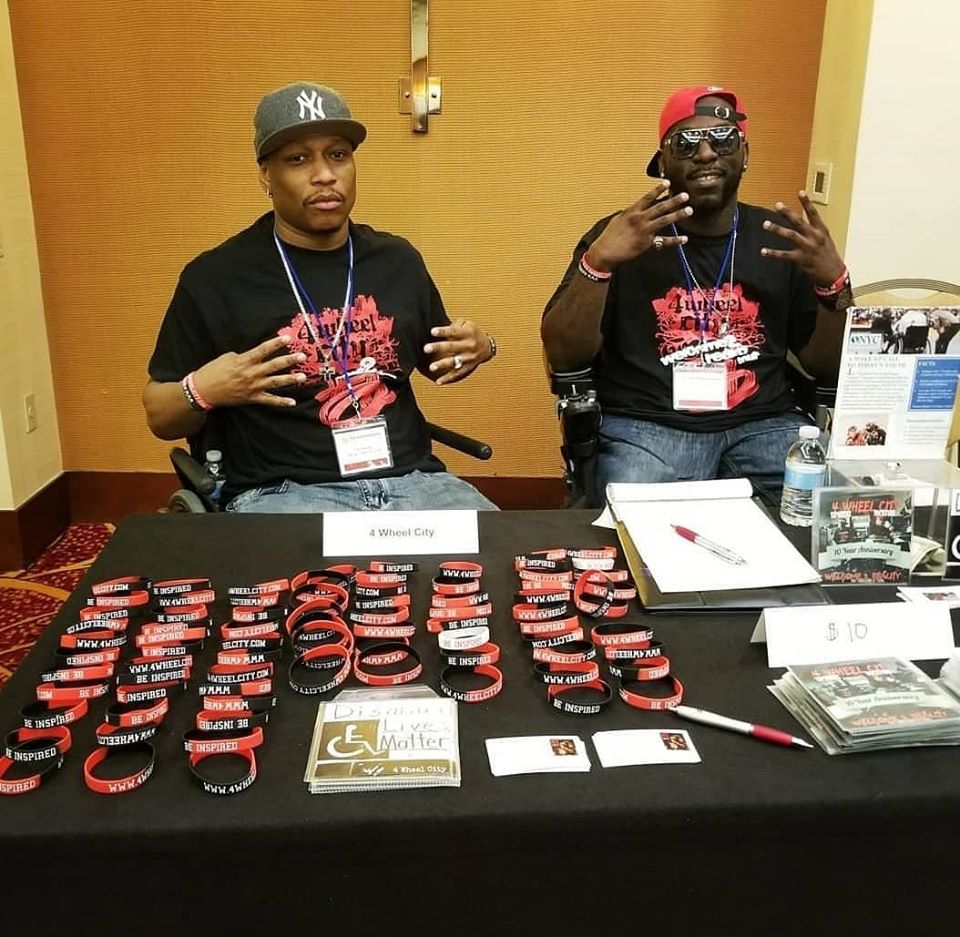
Like any performing artist worth their salt, 4 Wheel City has a wide range of merch that you can enjoy too!
4 Wheel City’s performance schedule and social media pages can be found at www.4wheelcity.com. We invite you to visit them too!
Founded by a quadriplegic, Cure Medical supports medical research programs in pursuit of a cure for urinary retention, paralysis, spinal cord injury and central nervous system disorders.
Enjoy Our Free Resources & Articles
CURE NATION is designed with you in mind, to offer assistance and education when you need it through a personal support program.
All of the information you find below and on our related social media pages is meant to guide you to places, topics and resources that enhance your life, while also connecting you with a growing group of friends.
View our lifestyle resources by condition type:
Multiple Sclerosis, Pelvic Organ Prolapse, Prostate Cancer, Spina Bifida, Spinal Cord Injury and Transverse Myelitis
- Sign up for our free, CURE NATION e-newsletter to have our latest stories delivered directly to you, once a month.
- Get our FREE LIFESTYLE + ACCESSIBLE TRAVEL BOOKS here.
- Meet us in person at a CURE NATION event.
- Have an idea you’d like to share? Let us know.
- Be sure to take minute to meet our Cure Advocates too.
You may also enjoy:
Para-Bobsled Star Josh Merryman Examines Life at High Velocity
Wheels2Walking Takes SCI Experiences from the Street to Your Screen
Visit these Spina Bifida Summer Camps for Kids
Henry Scott Addresses Urinary Retention After His Car Accident
Arlene Long Shares Her Love of Community!
Join Teal on the Hill for Spina Bifida Advocacy
SPORTS ‘N SPOKES, Abilities Expo & Cure Medical Host 2019 Wheels UP! Accessible Travel Photo Contest
Disability Advocate Jenn Wolff Helps You Build Resiliency

